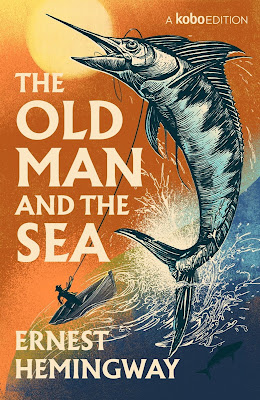I believe The Old Man and the Sea's beauty lies in its simplistic prose. Hemingway, known for avoiding wasted motion, tells a very rudimentary story that is exactly what the title implies. It's a simple fishing story about a very old man, seasoned by the sea, attempting to capture the big one.
The protagonist is Santiago, an experienced fisherman that has gone through a rather uncanny streak of fishing 84 straight days without catching a fish. His peers have come to think of him as unlucky. His only real friend, it seems, is a young boy named Manolin, who is Santiago's protegee. The boy takes care of Santiago by bringing him bait, food, and covering him up when he gets cold. The two share a common interest in American baseball, specifically the New York Yankees and Joe DiMaggio.
Santiago ventures out to sea again, only this time he goes further out into the gulf stream, where he uses four fishing poles. Eventually, Santiago captures the biggest fish of his life, an 18 foot marlin that may weigh more than 1,000 pounds. The issue is that Santiago has spent two nights at sea, far from home, and now must transport this huge fish. There's a wound to his hand, lots of sharks, and the hot sun to contend with on the return journey.
This is a very light adventure story that has an underlining premise that shines through. Hemingway's writing addresses aging, but also alienation. Santiago is originally from Spain and speaks a form of Spanish that isn't necessarily welcome in Cuba. His unlucky streak and age makes him very different than his peers, ousting him to the fringes of his own society. The story also speaks of human kindness and the idea that human companionship is a cycle. Santiago was there for Manolin when he was younger, now Manolin is there for him when he is older. It is really quite beautiful and Hemingway tells the tale in his own remarkable, signature, way. I hope to read more Hemingway.
Buy a copy HERE.


Masterpiece. Taut and deep. Like a line on a Marlin. I return to it often.
ReplyDeleteHis short stories are peerless too. Snows of Kilimanjaro is another must read if you're going deeper.
I suggest Have and Have Not(1937) and The Nick Adams Stories(1972) as a 'soft landing' further into his work.
ReplyDelete